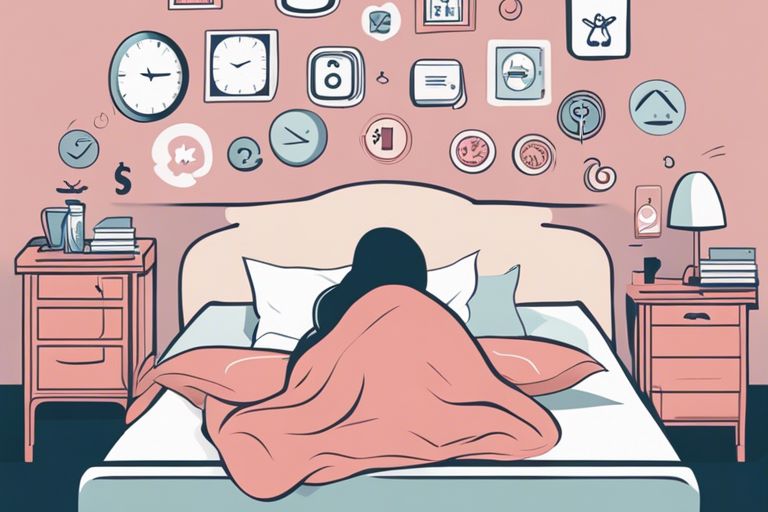Many of you may be experiencing issues with your health, mood, and overall well-being due to a lack of quality sleep. In this post, we will discuss common problems that arise from sleep deprivation and provide you with practical tips to help you get a better night’s rest.
The Consequences of Poor Sleep
Impaired Cognitive Function
Before you dismiss another night of tossing and turning, consider the impact it has on your cognitive function. Poor sleep can lead to difficulty concentrating, memory problems, and decreased productivity throughout your day.
Increased Risk of Chronic Diseases
Cognitive function is not the only thing at risk when you don’t prioritize quality rest. Poor sleep has been linked to an increased risk of chronic diseases such as heart disease, diabetes, and obesity.
Impaired sleep can disrupt crucial processes in your body, including hormone regulation and metabolism, making you more susceptible to developing these serious health conditions.
Mood Disorders and Anxiety
The consequences of inadequate sleep extend beyond physical health; they also impact your mental well-being. The lack of quality rest can leave you feeling irritable, moody, and anxious, affecting your overall quality of life.
The emotional toll of poor sleep can strain relationships, hinder your ability to cope with stress, and exacerbate existing mood disorders such as depression and anxiety.
Weakened Immune System
Concerning your immune system, quality sleep plays a significant role in keeping you healthy and resilient. Poor sleep can weaken your immune response, making you more susceptible to infections, colds, and other illnesses.
Your body relies on sleep to repair and regenerate cells, as well as produce important immune substances to protect you from harmful pathogens. By neglecting your sleep, you are compromising your body’s defense system and putting your health at risk.
Factors Affecting Sleep Quality
Assuming you are struggling with poor sleep, it’s vital to consider the various factors that can impact your sleep quality. Recognizing these factors can help you make necessary changes to improve your overall sleep experience.
Environmental Factors: Noise, Light, and Temperature
You might not be aware of it, but environmental factors such as noise, light, and temperature can significantly affect your ability to get a good night’s sleep. Knowing how these factors influence your sleep can help you create a more conducive sleep environment.
| You | Environmental Factors |
| 1. | Noise |
| 2. | Light |
| 3. | Temperature |
Lifestyle Factors: Diet, Exercise, and Screen Time
Affecting your sleep are lifestyle factors such as your diet, exercise routine, and screen time habits. Knowing how these aspects impact your sleep patterns is crucial in improving your overall sleep quality.
- 1. Diet
- 2. Exercise
- 3. Screen Time
You may not realize it, but what you eat, how active you are, and how much screen time you have before bed can all influence the quality of your sleep. Making positive changes in these areas can lead to better sleep hygiene.
Psychological Factors: Stress, Anxiety, and Depression
This can be challenging, as psychological factors like stress, anxiety, and depression can significantly impact your ability to fall asleep and stay asleep. It’s crucial to address these issues to improve your sleep quality.
- 1. Stress
- 2. Anxiety
- 3. Depression
Assuming you are dealing with high levels of stress, anxiety, or depression, it’s important to seek support and treatment to alleviate these psychological burdens. This can greatly improve your sleep quality and overall well-being.
Screen
How to Improve Sleep Quality
Establishing a Consistent Sleep Schedule
There’s a significant link between a consistent sleep schedule and quality of sleep. By going to bed and waking up at the same time every day, you can regulate your body’s internal clock, making it easier to fall asleep and wake up feeling refreshed.
Creating a Sleep-Conducive Environment
Even small changes to your bedroom can make a big difference in the quality of your sleep. Simple adjustments like keeping your room cool, dark, and quiet can help signal to your body that it’s time to wind down and rest.
For instance, investing in a comfortable mattress and pillows, using blackout curtains to block out light, and ensuring a quiet environment free of distractions can enhance your sleep quality significantly.
Relaxation Techniques: Tips for Calming the Mind and Body
While winding down before bed, incorporating relaxation techniques can help calm your mind and body, preparing you for a restful night’s sleep.
- Tips include practices like deep breathing exercises, progressive muscle relaxation, meditation, or gentle yoga stretches.
After a hectic day, these techniques can help you unwind, reduce stress levels, and promote a sense of relaxation that aids in falling asleep more easily.
Healthy Sleep Habits: Avoiding Stimulants and Electronics Before Bed
While winding down before bed, it’s imperative to avoid stimulants like caffeine and electronics that can interfere with your ability to fall asleep.
Understanding that the blue light emitted from screens can disrupt your body’s production of the sleep hormone melatonin, it’s best to power down electronics at least an hour before bedtime to ensure a more restful night’s sleep.
Summing up
On the whole, lack of quality sleep can lead to various health issues and affect your daily life. By implementing a bedtime routine, creating a comfortable sleep environment, and prioritizing sleep, you can improve your overall well-being and avoid the problems that arise from poor sleep habits. Be mindful of, quality sleep is crucial for your physical and mental health, so make it a priority in your daily routine.

